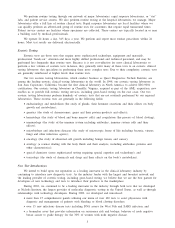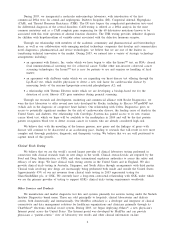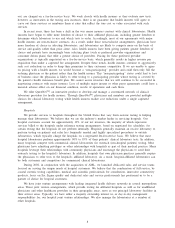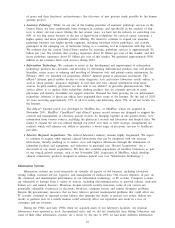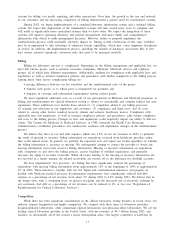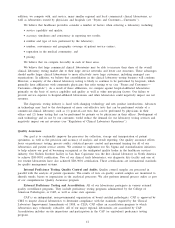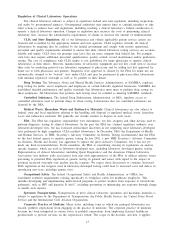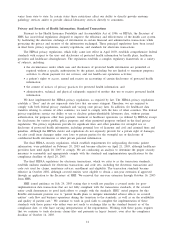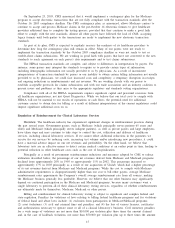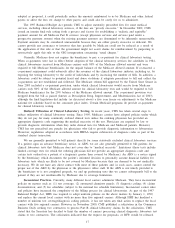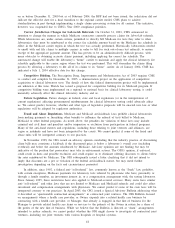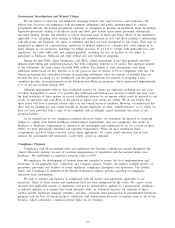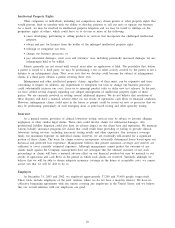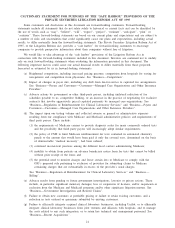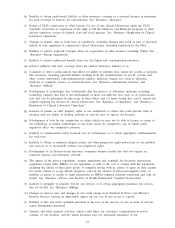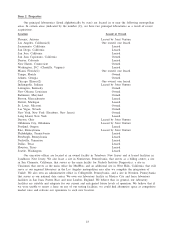Quest Diagnostics 2003 Annual Report Download - page 32
Download and view the complete annual report
Please find page 32 of the 2003 Quest Diagnostics annual report below. You can navigate through the pages in the report by either clicking on the pages listed below, or by using the keyword search tool below to find specific information within the annual report.On September 23, 2003, CMS announced that it would implement a contingency plan for the Medicare
program to accept electronic transactions that are not fully compliant with the transaction standards after the
October 16, 2003 compliance deadline. The CMS contingency plan, as announced, allows Medicare carriers to
continue to accept and process Medicare claims in the pre-October 16 electronic formats to give healthcare
providers additional time to complete the testing process, provided that they continue to make a good faith
effort to comply with the new standards. Almost all other payers have followed the lead of CMS, accepting
legacy formats until both parties to the transactions are ready to implement the new electronic transaction
standards.
As part of its plan, CMS is expected to regularly reassess the readiness of its healthcare providers to
determine how long the contingency plan will remain in effect. Many of our payers were not ready to
implement the transaction standards by the October 2003 compliance deadline or were not ready to test or
trouble-shoot claims submissions. We are working in good faith with payers that have not converted to the new
standards to reach agreement on each payer’s data requirements and to test claims submissions.
The HIPAA transaction standards are complex, and subject to differences in interpretation by payers. For
instance, some payers may interpret the standards to require us to provide certain types of information,
including demographic information not usually provided to us by physicians. As a result of inconsistent
interpretations of transaction standards by payers or our inability to obtain certain billing information not usually
provided to us by physicians, we could face increased costs and complexity, a temporary disruption in receipts
and ongoing reductions in reimbursements and net revenues. We are working closely with our payers to
establish acceptable protocols for claims submissions and with our trade association and an industry coalition to
present issues and problems as they arise to the appropriate regulators and standards setting organizations.
Compliance with all of the HIPAA requirements requires significant capital and personnel resources from
all healthcare organizations, not just Quest Diagnostics. While we believe that our total costs to comply with
HIPAA will not be material to our results of operations or cash flows, the potential need for additional
customer contact to obtain data for billing as a result of different interpretations of the current regulations could
impose significant additional costs on us.
Regulation of Reimbursement for Clinical Laboratory Services
Overview. The healthcare industry has experienced significant changes in reimbursement practices during
the past several years. Government payers, such as Medicare (which principally serves patients 65 years and
older) and Medicaid (which principally serves indigent patients), as well as private payers and large employers,
have taken steps and may continue to take steps to control the cost, utilization and delivery of healthcare
services, including clinical laboratory services. If we cannot offset additional reductions in the payments we
receive for our services by reducing costs, increasing test volume and/or introducing new procedures, it could
have a material adverse impact on our net revenues and profitability. On the other hand, we believe that
laboratory tests are an effective means to detect certain medical conditions at an earlier point in time, leading to
potential reduction in other healthcare costs such as the cost of hospitalization.
Principally as a result of government reimbursement reductions and measures adopted by CMS to reduce
utilization described below, the percentage of our net revenues derived from Medicare and Medicaid programs
declined from approximately 20% in 1995 to approximately 15% in 2002. This percentage increased to
approximately 17% in 2003 principally as a result of our acquisition of Unilab, which had a higher percentage
of its net revenues derived from Medicare and Medicaid programs. While the cost to comply with Medicare
administrative requirements is disproportionately higher than our cost to bill other payers, average Medicare
reimbursement rates approximate the Company’s overall average reimbursement rate from all sources, making
the Medicare business generally less profitable. However, we believe that our other business may significantly
depend on continued participation in the Medicare and Medicaid programs, because many customers want a
single laboratory to perform all of their clinical laboratory testing services, regardless of whether reimbursements
are ultimately made by themselves, Medicare, Medicaid or other payers.
Billing and reimbursement for clinical laboratory testing is subject to significant and complex federal and
state regulation. Penalties for violations of laws relating to billing federal healthcare programs and for violations
of federal fraud and abuse laws include: (1) exclusion from participation in Medicare/Medicaid programs;
(2) asset forfeitures; (3) civil and criminal fines and penalties; and (4) the loss of various licenses, certificates
and authorizations necessary to operate some or all of a clinical laboratory’s business. Civil monetary penalties
for a wide range of violations are not more than $10,000 per violation plus three times the amount claimed
and, in the case of kickback violations, not more than $50,000 per violation plus up to three times the amount
15


